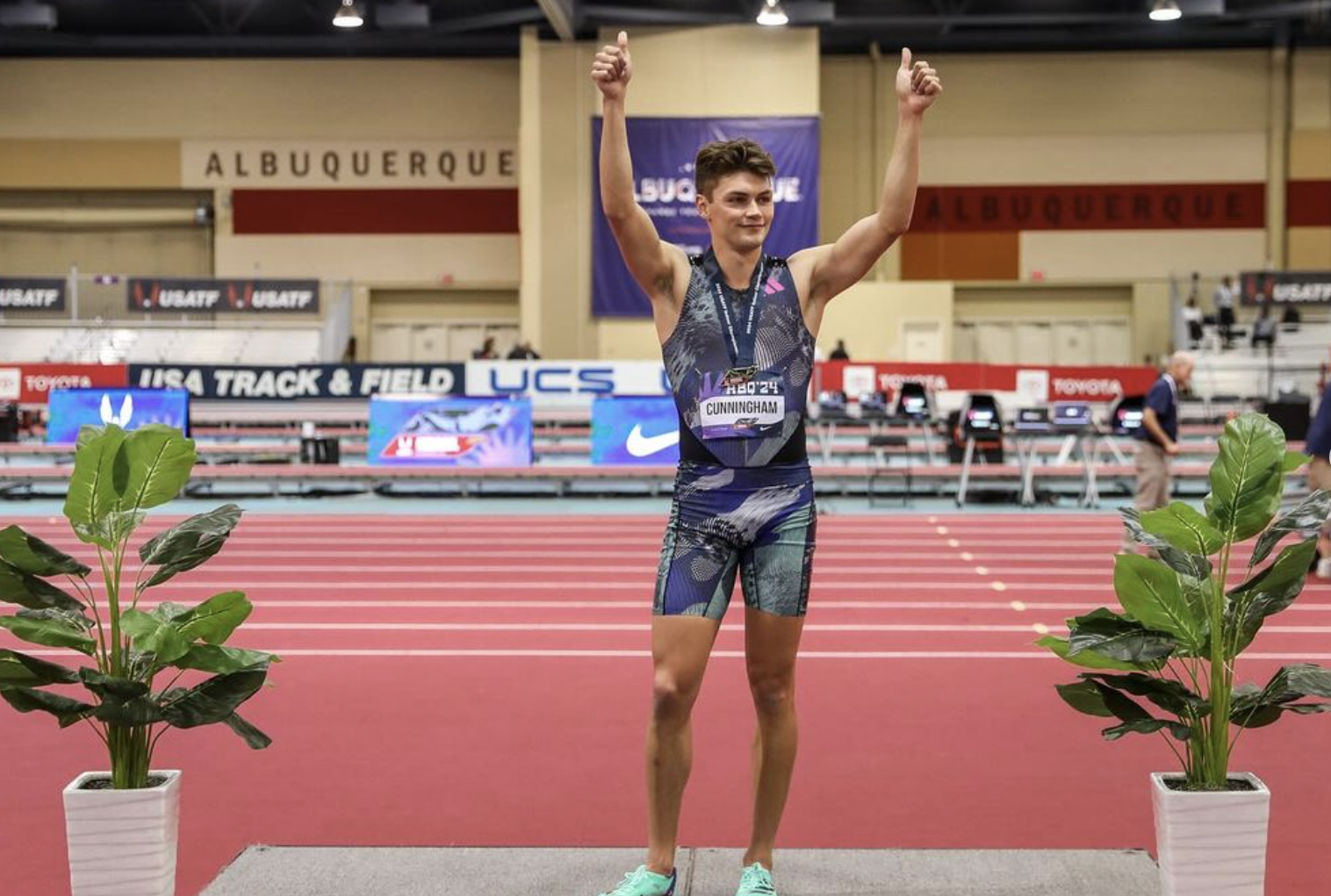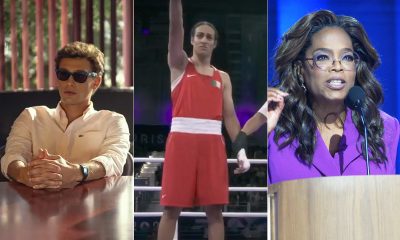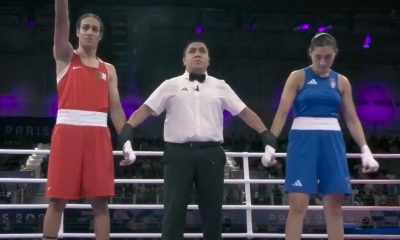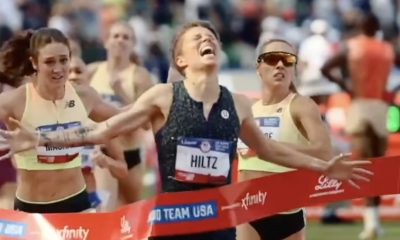Sports
High hurdler Trey Cunningham comes out as gay
Florida State University alum grew up in Ala.

He didn’t get to punch his ticket to the Olympics this summer but Trey Cunningham, 26, one of the world’s best high hurdlers, is in the news for a far more personal reason: He publicly came out as gay.
“We say our goals out loud,” Cunningham told the New York Times Monday, explaining a technique he has relied upon in his training as an elite athlete. “If there’s something we want to achieve, we say it. Putting something in words makes it real.”
His sexuality isn’t exactly a secret. Cunningham came out to his parents and friends by phone five years ago at age 20.
“It was the scariest thing I’ve ever done,” he told the Times, recalling that he found himself dripping with sweat as he waited for the ringing to end and for the calls to be connected.
Cunningham revealed to the newspaper that he got the sense that at least some of his friends were not at all surprised by this news, and had been “waiting for me,” he said. “I was really lucky to have a group of people who did not care.”
He was in college then, starting to “explore the idea” of his sexual attraction.
“It took me awhile to know it felt right,” he said.
His high school years in Winfield, Ala., were a time for friends and fun, dreaming of playing pro basketball with the Boston Celtics before discovering he enjoyed “flinging myself at solid objects at high speed,” he said. It was not a place conducive to dating other boys.
Cunningham recalled his hometown as “rural, quite conservative, quite religious: The sort of place where you did not want to be the gay kid at school,” he told the paper. “So, I had certain expectations of what my life would look like, and it took me a little while to get my head around it, looking different to that.”
So, it was not a surprise that his parents gave him some “pushback” — in his words — when he called them with the news five years ago.
“They had certain expectations for their little boy, for what his life would be like, and that’s OK,” he told the Times. “I gave them a 5-year grace period. I had to take my time. They could take theirs, too.”
Cunningham drew a parallel between his own process and theirs. “What was true for me was also true for my parents,” said the world-class sprinter.
And he is world-class, even if he’ll be watching the Summer Games instead of competing in them. As the Times reported, Cunningham is ranked 11th in the world. In 2022, he won the silver medal in high hurdles at the world championships in Eugene, Ore., and last month he placed ninth in the 110-meter hurdles at the U.S. Olympic trials.
“If you do well in the U.S. trials, you know you have a good shot at a medal,” he said.
Following his disappointing finish in what he described as a “stacked field” of competitors, he is coming out as gay in an interview with a journalist now because everyone who he feels needs to know has known for some time, he said. Also, he recognizes that being out is still rare.
“There are lots of people who are in this weird space,” said Cunningham. “They’re not out. But it is kind of understood.”
What he hopes is that both sports and the wider world will someday get to a place where “people do not have to ‘come out,” he said, where people can “just get on with being them.”
In addition to being an elite athlete, Cunningham has a Master of Science degree from Florida State University, a deal with Adidas and — with his scruffy square jaw and pouty lips — he is a sought-after Ford model.
He said in the interview that he realized coming out comes with practical and potentially financial considerations: Competing in countries where being gay is a crime, like Qatar. Although he doesn’t think hiding his sexuality inhibited his performance or that some great weight is now lifted, he believes being public about it has value.
There are times, Cunningham said, when it pays to say something out loud, to make things real. This is that time.
Sports
Attitude! French ice dancers nail ‘Vogue’ routine
Cizeron and Fournier Beaudry strike a pose in memorable Olympics performance

Madonna’s presence is being felt at the Olympic Games in Italy.
Guillaume Cizeron and his rhythm ice dancing partner Laurence Fournier Beaudry of France performed a flawless skate to Madonna’s “Vogue” and “Rescue Me” on Monday.
The duo scored an impressive 90.18 for their effort, the best score of the night.
“We’ve been working hard the whole season to get over 90, so it was nice to see the score on the screen,” Fournier Beaudry told Olympics.com. “But first of all, just coming out off the ice, we were very happy about what we delivered and the pleasure we had out there. With the energy of the crowd, it was really amazing.”
Watch the routine on YouTube here.
Italy
Olympics Pride House ‘really important for the community’
Italy lags behind other European countries in terms of LGBTQ rights

The four Italian advocacy groups behind the Milan Cortina Winter Olympics’ Pride House hope to use the games to highlight the lack of LGBTQ rights in their country.
Arcigay, CIG Arcigay Milano, Milano Pride, and Pride Sport Milano organized the Pride House that is located in Milan’s MEET Digital Culture Center. The Washington Blade on Feb. 5 interviewed Pride House Project Manager Joseph Naklé.
Naklé in 2020 founded Peacox Basket Milano, Italy’s only LGBTQ basketball team. He also carried the Olympic torch through Milan shortly before he spoke with the Blade. (“Heated Rivalry” stars Hudson Williams and Connor Storrie last month participated in the torch relay in Feltre, a town in Italy’s Veneto region.)
Naklé said the promotion of LGBTQ rights in Italy is “actually our main objective.”
ILGA-Europe in its Rainbow Map 2025 notes same-sex couples lack full marriage rights in Italy, and the country’s hate crimes law does not include sexual orientation or gender identity. Italy does ban discrimination based on sexual orientation in employment, but the country’s nondiscrimination laws do not include gender identity.
ILGA-Europe has made the following recommendations “in order to improve the legal and policy situation of LGBTI people in Italy.”
• Marriage equality for same-sex couples
• Depathologization of trans identities
• Automatic co-parent recognition available for all couples
“We are not really known to be the most openly LGBT-friendly country,” Naklé told the Blade. “That’s why it (Pride House) was really important for the community.”
“We want to use the Olympic games — because there is a big media attention — and we want to use this media attention to raise the voice,” he added.

Naklé noted Pride House will host “talks and roundtables every night” during the games that will focus on a variety of topics that include transgender and nonbinary people in sports and AI. Another will focus on what Naklé described to the Blade as “the importance of political movements now to fight for our rights, especially in places such as Italy or the U.S. where we are going backwards, and not forwards.”
Seven LGBTQ Olympians — Italian swimmer Alex Di Giorgio, Canadian ice dancers Paul Poirier and Kaitlyn Weaver, Canadian figure skater Eric Radford, Spanish figure skater Javier Raya, Scottish ice dancer Lewis Gibson, and Irish field hockey and cricket player Nikki Symmons — are scheduled to participate in Pride House’s Out and Proud event on Feb. 14.
Pride House Los Angeles – West Hollywood representatives are expected to speak at Pride House on Feb. 21.
The event will include a screening of Mariano Furlani’s documentary about Pride House and LGBTQ inclusion in sports. The MiX International LGBTQ+ Film and Queer Culture Festival will screen later this year in Milan. Pride House Los Angeles – West Hollywood is also planning to show the film during the 2028 Summer Olympics.
Naklé also noted Pride House has launched an initiative that allows LGBTQ sports teams to partner with teams whose members are either migrants from African and Islamic countries or people with disabilities.
“The objective is to show that sports is the bridge between these communities,” he said.
Bisexual US skier wins gold
Naklé spoke with the Blade a day before the games opened. The Milan Cortina Winter Olympics will close on Feb. 22.
More than 40 openly LGBTQ athletes are competing in the games.
Breezy Johnson, an American alpine skier who identifies as bisexual, on Sunday won a gold medal in the women’s downhill. Amber Glenn, who identifies as bisexual and pansexual, on the same day helped the U.S. win a gold medal in team figure skating.
Glenn said she received threats on social media after she told reporters during a pre-Olympics press conference that LGBTQ Americans are having a “hard time” with the Trump-Vance administration in the White House. The Associated Press notes Glenn wore a Pride pin on her jacket during Sunday’s medal ceremony.
“I was disappointed because I’ve never had so many people wish me harm before, just for being me and speaking about being decent — human rights and decency,” said Glenn, according to the AP. “So that was really disappointing, and I do think it kind of lowered that excitement for this.”
Puerto Rico
Bad Bunny shares Super Bowl stage with Ricky Martin, Lady Gaga
Puerto Rican activist celebrates half time show

Bad Bunny on Sunday shared the stage with Ricky Martin and Lady Gaga at the Super Bowl halftime show in Santa Clara, Calif.
Martin came out as gay in 2010. Gaga, who headlined the 2017 Super Bowl halftime show, is bisexual. Bad Bunny has championed LGBTQ rights in his native Puerto Rico and elsewhere.
“Not only was a sophisticated political statement, but it was a celebration of who we are as Puerto Ricans,” Pedro Julio Serrano, president of the LGBTQ+ Federation of Puerto Rico, told the Washington Blade on Monday. “That includes us as LGBTQ+ people by including a ground-breaking superstar and legend, Ricky Martin singing an anti-colonial anthem and showcasing Young Miko, an up-and-coming star at La Casita. And, of course, having queer icon Lady Gaga sing salsa was the cherry on the top.”
La Casita is a house that Bad Bunny included in his residency in San Juan, the Puerto Rican capital, last year. He recreated it during the halftime show.
“His performance brought us together as Puerto Ricans, as Latin Americans, as Americans (from the Americas) and as human beings,” said Serrano. “He embraced his own words by showcasing, through his performance, that the ‘only thing more powerful than hate is love.’”
-

 Opinions5 days ago
Opinions5 days agoUnconventional love: Or, fuck it, let’s choose each other again
-

 National4 days ago
National4 days agoFour bisexual women on stereotypes, erasure, representation, and joy
-

 Theater4 days ago
Theater4 days agoMagic is happening for Round House’s out stage manager
-

 Baltimore2 days ago
Baltimore2 days ago‘Heated Rivalry’ fandom exposes LGBTQ divide in Baltimore




















